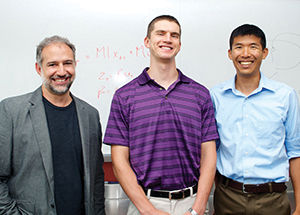Learning has a limit, study says

September 3, 2014
Those who have suffered from a stroke or other brain injury could recover more efficiently because of data from researchers at Carnegie Mellon University and Pitt.
The Center for the Neural Basis of Cognition, the name given to the project joining both universities, published its study “Neural constraints on learning,” in last month’s issue of Nature magazine. According to the results, learning new skills, such as a different verb tense in a foreign language, becomes easier when the desired skills build upon already acquired ones.
The study also found that “cognitive flexibility has a limit,” Aaron P. Batista, assistant professor of bioengineering at Pitt and co-researcher on the study, said in a release. Data shows that, sometimes, certain skills cannot be learned and that there are “constraints” on how flexible the brain can be during the learning process.
Byron M. Yu, assistant professor of electrical, computer and biomedical engineering at Carnegie Mellon and researcher on the study, said the techniques used in this study could be utilized “to coach patients to generate proper neural activity.”
“These findings could be the basis for novel rehabilitation procedures for the many neural disorders that are characterized by improper neural activity,” Yu said.
The study included training rhesus macaque monkeys to use brain-computer interface (BCI) technology that is often used by the disabled to communicate. The researchers hooked the animals’ brains up to screens displaying a cursor. The animals’ brain activity would then move the cursor in a specific direction, depending on what types of activities they were supposed to do.
The researchers directed the monkeys to repeat a series of neural activity patterns. When the patterns repeated often, they were able to move the cursor with ease. But when the monkeys tried to learn new patterns that they had not experienced before, it was much more difficult for them to move the cursors.
Patrick T. Sadtler, a Ph.D. candidate in Pitt’s Department of Bioengineering, compared learning to cooking with the wrong ingredients. Trying to learn something new with virtually no base knowledge, Sadtler said, is like trying to make hamburgers with sugar, baking soda and eggs.
“The brain works in a similar way during learning,” he said. “We found that subjects were able to more readily recombine familiar activity patterns in new ways relative to creating entirely novel patterns.”
The National Institutes of Health, National Science Foundation and the Burroughs Wellcome Fund funded the project.
“We wanted to study how the brain changes its activity when you learn and also how its activity cannot change,” Batista said. “We wanted to find out what [the] limit [of cognitive flexibility] looks like in terms of neurons.”







